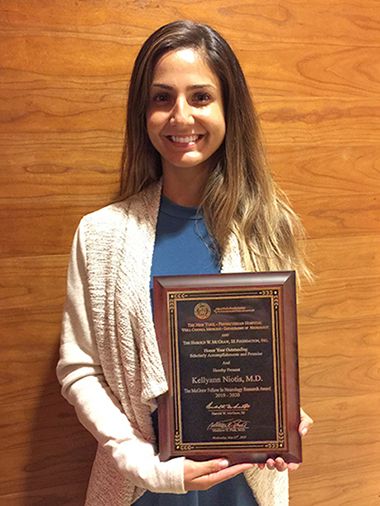Exclusive Training Partnership with Memorial Sloan Kettering Cancer Center
Weill Cornell Neurology is the only neurology residency program in New York City with a long-standing and intimate relationship with Memorial Sloan Kettering Cancer Center (MSKCC). Our residents benefit from the complexity of neurological cases at MSKCC, dedicated mentorship, and abundant research opportunities. Residents are able to contribute to dozens of clinical trials and work on both translational and basic science research projects. Perhaps the most exciting aspect of time at MSKCC is the daily opportunity to discuss cases with senior neurologists and neuro-oncologists in morning report. Faculty routinely host housestaff breakfasts to discuss the emotional and psychological aspects of oncological care in addition to resident wellness. A number of recent graduates of our program have gone on to become fellows and attendings at MSKCC.
Exceptional Research Opportunities, Research Track, and the McGraw Fellow in Neurology Research

Residents in our program are actively involved in research. We work with faculty in the Brain and Mind Research Institute, the Clinical and Translational Neuroscience Unit, subspecialty centers, and education faculty on various scholarly projects. For mentored projects in basic science, residents work with faculty at Weill Cornell Medicine and MSKCC. Our annual Resident Research Symposium features residents presenting on work they previously presented at various scientific meetings or have published. Our residents have had a robust presence at meetings including the International Stroke Conference and the American Academy of Neurology. Identification of candidates for numerous clinical trials is routine for our residents in inpatient and outpatient practice. One resident is chosen annually at the end of the PGY III year to be honored as the McGraw Fellow in Neurology Research for their PGY IV year where substantial dedicated research time will be alotted. In addition, one resident position every 4 years is supported by the Brain and Mind Research Institute to plan for research elective time through the 4 years, including substantial and blocked research elective time during the PGY IV year.
Neurology Resident as Educator Track
Residents interested in developing careers as neurology educators may apply for selection to this competitive track during their PGY I year. Formal teaching, curriculum development, and committee responsibilities are graded by PGY year, with participation in an education research project mentored by our core education faculty.
Unique Morning Report
Morning report at Weill Cornell takes place each morning, where consult residents present interesting neurological cases from the prior day and night. Uniquely, several Neurology faculty including our chair Dr. Fink and our program director Dr. Robbins attend morning report each day to discuss cases, lending expert advice and mentorship to the inpatient teams.
Mobile Stroke Treatment Units
In partnership with NewYork-Presbyterian and FDNY, we feature 3 Mobile Stroke Treatment Units (MSTU) equipped with trained personnel, telemedicine, and CT scanners that bring timely stroke care including thrombolysis to the patient. Residents can actively participate in stroke triage and can rotate on the MSTU itself.
Global Health Opportunities at Weill Cornell
The Department of Neurology at Weill Cornell offers a number of global health opportunities for its residents by supporting travel to different sites. Weill Cornell has a long-standing collaboration with Weill Bugando Hospital in Mwanza, Tanzania, where residents manage neurological illnesses not commonly encountered in the United States. Typically, residents travel to Tanzania during their PGY-4 year. In recent years, residents have also traveled to the Department of Neurology at Addis Ababa University in Ethiopia and to the Open Medical Institute in Salzburg, Austria enabling resident rotations in epilepsy and other neurology experiences.
Prioritization of Resident Wellness

Wellness is a critical part of the success of the members of our Department of Neurology, particularly our residents. We annually appoint Wellness Chief Residents who lead monthly social and other events for our residency program, and helps lead institution-wide initiatives from NYP within our department. We have a monthly Wellness Morning Report led by Dr. Joshua Weaver and a robust Women in Neurology group with a steering committee involving many residents. We prioritize making residents feel highly valued as emerging neurologists in a variety of ways, including “resident of the month” awards, profiling the professional activities of residents on social media including on Twitter (@WCMCNeurology) and a residency Instagram account (@Cornell_Neurology), and highlighting scholarly accomplishments at our annual Neurology Resident Research Symposium, working together with the Research Chief Resident.
Our Program Coordinator Janice Void, Registered Yoga Teacher, offers yoga and meditation sessions to residents to encourage self-care and wellness initiatives.
Bright Lights, Big City!
We have one of the greatest cities of the world on our doorstep, with Broadway shows, Central Park, world-class museums and shops, and some of the greatest sports teams in the country all within reach. The Upper East Side is bustling, with a Riverwalk promenade, a new subway line enhancing access to anywhere in New York City, and dozens of new restaurants and bars that all opened in the last few years.
A Residency Program Family
Though our residents come from diverse backgrounds, we form a cohesive family, supporting each other and forging lifelong friendships over the course of residency. We enjoy working with each other in the hospital as much as we enjoy spending time exploring the city and all that the surrounding areas have to offer. A number of residents have started their own families as residents as well!
Diversity and Community Engagement
We engage neurology trainees, faculty, and staff in dialogue, training, policies, practices, and recruitment to promote a diverse and inclusive environment for all activities in our department. We invite residents to be key members of our department Committee. We prioritize educational programming including Grand Rounds on topics of diversity, social determinants of health, and inclusiveness as it relates to neurological disorders. We engage our chief residents and Committee members in efforts for broadening the neurology pipeline. We have active strategic initiatives to:
- Prioritize equitable care in our resident clinics
- Fast track mentoring for undergraduate students interested in neurology
- Nominate department representation to institutional diversity efforts
- Organize sessions on professionalism and bias
- Ensure participation in community outreach activities
- Advocate for cultural appreciation in department wellness events

